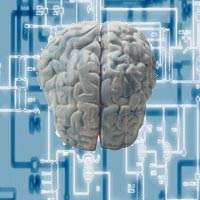John,
Thanks for the response (unsolicited though it may have been). I am posting below a piece by Anthony Flew concerning John Wisdom's parable of the gardener. I have always found it a rather convincing argument that religious claims are really, in the final analysis, nonsensical--devoid of meaning. Do I believe in God? I don't know what you mean. I don't think YOU know what you mean. Some argue that because of this, the best thing to say is that you are agnostic. While, perhaps technically true, I think it gives the wrong impression. I do not say I am agnostic about Regextipation, whose definition is "that which seeks the warmth in the space of a preordained state, unreserved in its expanse of munificence." Instead, I say, "What nonsense!" I call myself an atheist, because I do not doubt that such talk is meaningless.
Hugh
Theology and Falsification
The following excerpt was published in Reason and Responsibility (1968).
by Antony Flew
Let us begin with a parable. It is a parable developed from a tale told by John Wisdom in his haunting and revolutionary article "Gods."[1] Once upon a time two explorers came upon a clearing in the jungle. In the clearing were growing many flowers and many weeds. One explorer says, "Some gardener must tend this plot." The other disagrees, "There is no gardener." So they pitch their tents and set a watch. No gardener is ever seen. "But perhaps he is an invisible gardener." So they set up a barbed-wire fence. They electrify it. They patrol with bloodhounds. (For they remember how H. G. Well's The Invisible Man could be both smelt and touched though he could not be seen.) But no shrieks ever suggest that some intruder has received a shock. No movements of the wire ever betray an invisible climber. The bloodhounds never give cry. Yet still the Believer is not convinced. "But there is a gardener, invisible, intangible, insensible, to electric shocks, a gardener who has no scent and makes no sound, a gardener who comes secretly to look after the garden which he loves." At last the Sceptic despairs, "But what remains of your original assertion? Just how does what you call an invisible, intangible, eternally elusive gardener differ from an imaginary gardener or even from no gardener at all?"
In this parable we can see how what starts as an assertion, that something exist or that there is some analogy between certain complexes of phenomena, may be reduced step by step to an altogether different status, to an expression perhaps of a "picture preference."[2] The Sceptic says there is no gardener. The Believer says there is a gardener (but invisible, etc.). One man talks about sexual behavior. Another man prefers to talk of Aphrodite (but knows that there is not really a superhuman person additional to, and somehow responsible for, all sexual phenomena).[3] The process of qualification may be checked at any point before the original assertion is completely withdrawn and something of that first assertion will remain (Tautology). Mr. Wells' invisible man could not, admittedly, be seen, but in all other respects he was a man like the rest of us. But though the process of qualification may be and of course usually is, checked in time, it is not always judicially so halted. Someone may dissipate his assertion completely without noticing that he has done so. A fine brash hypothesis may thus be killed by inches, the death by a thousand qualifications.
And in this, it seems to me, lies the peculiar danger, the endemic evil, of theological utterance. Take such utterances as "God has a plan," "God created the world," "God loves us as a father loves his children." They look at first sight very much like assertions, vast cosmological assertions. Of course, this is no sure sign that they either are, or are intended to be, assertions. But let us confine ourselves to the cases where those who utter such sentences intended them to express assertions. (Merely remarking parenthetically that those who intend or interpret such utterances as crypto-commands, expressions of wishes, disguised ejaculations, concealed ethics, or as anything else but assertions, are unlikely to succeed in making them either properly orthodox or practically effective).
Now to assert that such and such is the case is necessarily equivalent to denying that such and such is not the case.[4] Suppose then that we are in doubt as to what someone who gives vent to an utterance is asserting, or suppose that, more radically, we are sceptical as to whether he is really asserting anything at all, one way of trying to understand (or perhaps to expose) his utterance is to attempt to find what he would regard as counting against, or as being incompatible with, its truth. For if the utterance is indeed an assertion, it will necessarily be equivalent to a denial of the negation of the assertion. And anything which would count against the assertion, or which would induce the speaker to withdraw it and to admit that it had been mistaken, must be part of (or the whole of) the meaning of the negation of that assertion. And to know the meaning of the negation of an assertion, is as near as makes no matter, to know the meaning of that assertion.[5] And if there is nothing which a putative assertion denies then there is nothing which it asserts either: and so it is not really an assertion. When the Sceptic in the parable asked the Believer, "Just how does what you call an invisible, intangible, eternally elusive gardener differ from an imaginary gardener or even from no gardener at all?" he was suggesting that the Believer's earlier statement had been so eroded by qualification that it was no longer an assertion at all.
Now it often seems to people who are not religious as if there was no conceivable event or series of events the occurrence of which would be admitted by sophisticated religious people to be a sufficient reason for conceding "there wasn't a God after all" or "God does not really love us then." Someone tells us that God loves us as a father loves his children. We are reassured. But then we see a child dying of inoperable cancer of the throat. His earthly father is driven frantic in his efforts to help, but his Heavenly Father reveals no obvious sign of concern. Some qualification is made — God's love is "not merely human love" or it is "an inscrutable love," perhaps — and we realize that such suffering are quite compatible with the truth of the assertion that "God loves us as a father (but of course…)." We are reassured again. But then perhaps we ask: what is this assurance of God's (appropriately qualified) love worth, what is this apparent guarantee really a guarantee against? Just what would have to happen not merely (morally and wrongly) to tempt but also (logically and rightly) to entitle us to say "God does not love us" or even "God does not exist"? I therefore put to the succeeding symposiasts the simple central questions, "What would have to occur or to have occurred to constitute for you a disproof of the love of, or the existence of, God?"
Notes
1
P.A.S., 1944-5, reprinted as Ch. X of Logic and Language, Vol. I (Blackwell, 1951), and in his Philosophy and Psychoanalysis (Blackwell, 1953).
2
Cf. J. Wisdom, "Other Minds," Mind, 1940; reprinted in his Other Minds (Blackwell, 1952).
3
Cf. Lucretius, De Rerum Natura, II, 655-60.
4
For those who prefer symbolism: p = ~ ~ p.
5
For by simply negating ~ p we get p: = ~ ~ p = p.
Edited by hughbristic, 08 July 2003 - 03:19 PM.















































